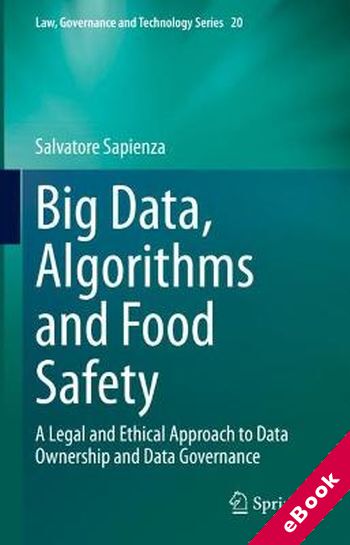
The device(s) you use to access the eBook content must be authorized with an Adobe ID before you download the product otherwise it will fail to register correctly.
For further information see https://www.wildy.com/ebook-formats
Once the order is confirmed an automated e-mail will be sent to you to allow you to download the eBook.
All eBooks are supplied firm sale and cannot be returned. If you believe there is a fault with your eBook then contact us on ebooks@wildy.com and we will help in resolving the issue. This does not affect your statutory rights.
This book identifies the principles that should be applied when processing Big Data in the context of food safety risk assessments. Food safety is a critical goal in the protection of individuals' right to health and the flourishing of the food and feed market. Big Data is fostering new applications capable of enhancing the accuracy of food safety risk assessments. An extraordinary amount of information is analysed to detect the existence or predict the likelihood of future risks, also by means of machine learning algorithms. Big Data and novel analysis techniques are topics of growing interest for food safety agencies, including the European Food Safety Authority (EFSA). This wealth of information brings with it both opportunities and risks concerning the extraction of meaningful inferences from data. However, conflicting interests and tensions among the parties involved are hindering efforts to find shared methods for steering the processing of Big Data in a sound, transparent and trustworthy way. While consumers call for more transparency, food business operators tend to be reluctant to share informational assets. This has resulted in a considerable lack of trust in the EU food safety system. A recent legislative reform, supported by new legal cases, aims to restore confidence in the risk analysis system by reshaping the meaning of data ownership in this domain. While this regulatory approach is being established, breakthrough analytics techniques are encouraging thinking about the next steps in managing food safety data in the age of machine learning.
The book focuses on two core topics - data ownership and data governance - by evaluating how the regulatory framework addresses the challenges raised by Big Data and its analysis in an applied, significant, and overlooked domain. To do so, it adopts an interdisciplinary approach that considers both the technological advances and the policy tools adopted in the European Union, while also assuming an ethical perspective when exploring potential solutions. The conclusion puts forward a proposal: an ethical blueprint for identifying the principles - Security, Accountability, Fairness, Explainability, Transparency and Privacy - to be observed when processing Big Data for food safety purposes, including by means of machine learning. Possible implementations are then discussed, also in connection with two recent legislative proposals, namely the Data Governance Act and the Artificial Intelligence Act.